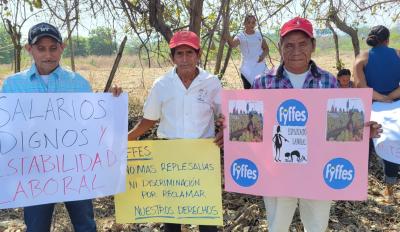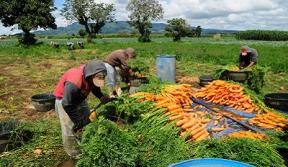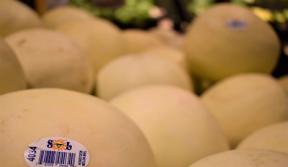
March 29, 2023
For Immediate Release
Contact: Rachel Cohen, GLJ-ILRF, racohen78 [at] gmail.com
Jeffrey Boyd, IUF, jeffrey.boyd [at] iuf.org
Choluteca, Honduras – Today hundreds of seasonal workers marched on the Japanese-owned billion-dollar multinational fruit company Fyffes plc to deliver a petition signed by more than 1000 melon farmworkers demanding their international labor rights, including their right to form their own independent union. The march comes after multiple accidents have occurred, including workers being hospitalized from toxic fumes in a Fyffes packing area, and a worker who was recently hit by a truck and died on the job.
The workers, who are organizing with the independent farmworker union El Sindicato de Trabajadores de la Agroindustria y Similares (STAS), renewed calls for Fyffes, a leading exporter of fruit to the United States and Europe, to resume negotiations for a binding agreement to protect workers’ international labor rights. STAS is affiliated to the International Union of Food, Agricultural, Hotel, Restaurant, Catering, Tobacco and Allied Workers (IUF) and working in close partnership with Global Labor Justice - International Labor Rights Forum (GLJ-ILRF) to hold this transnational fruit company accountable in the US where the majority of the melons picked in Honduras are sold.
Workers say they need a union at Fyffes that will enable them to protect their health and safety on the job, bargain for fair wages and create more job security.
“Workers at these melon plantations want dignity and rights on the job,” said Tomas Membreño, STAS President, “Over one thousand workers are standing strong and fighting for a voice. We’re calling on STAS Fyffes to heed their call and come back to the negotiating table and sign a labor rights agreement that enables workers to form the union they need to ensure safe working conditions and fair pay.”
Kelyn Estrada, a 26 year old single mother of two who has worked in the melons for the last six seasons said, “This year we’ve had to work even longer days and cover almost double the harvest area than before. We are bent over in the oppressive heat all day long and we still make so little that it’s hard to feed our families. We are fighting today to tell the company loud and clear: sign the agreement to respect our rights as workers and as human beings.”
Workers report they cannot access the government “social security program,” which provides public healthcare. Marcio Noe Garcia, a long-time worker at Fyffes who for four years would wear a chemical sprayer on his back and spray the melon plants, recently collapsed upon arrival at the job and had to be rushed to the hospital. While still unsure what caused this, without “social security” he has not been able to access adequate healthcare and has incurred burdensome costs for medical treatments.
“We need an independent union so we can work with dignity and safety and support our families,” said Santos Felipa Salinas. “I have worked in the melon plantations of Fyffes since I was fourteen years old. For 26 years I’ve given my labor to this company but this year I was locked out of work and had no way to support my family. I was so desperate I decided to try to cross the border and go to the United States but I didn’t make it, so now I’m here to fight to move my family forward.”
Today as they marched on the fields, farmworkers said they want to form their own union with STAS so that together they can win good jobs that will enable them to work safely and support themselves and their families.
“Fyffes needs to listen to the women and men who plant, pick and pack their melons year after year and who today have demonstrated incredible courage with over 1,000 workers standing together to call for change,” said Jennifer (JJ) Rosenbaum. “Fyffes has the opportunity to make good on its claims to focus on “sustainability” and “shared values” with growers and customers and sign the agreement with STAS to guarantee workers international labor rights and be celebrated for moving forward as a leading multinational agricultural company that respects workers’ rights in the Global South.”
IUF General Secretary Sue Longley stated, “The right to organize is the enabling right that ensures unions can win safe workplaces and that workers have a voice on the job. The IUF calls on Fyffes to respect international labour standards, especially those on freedom of association, collective bargaining and occupational health and safety.”
###
Global Labor Justice – International Labor Rights Forum (GLJ – ILRF) is a non-governmental organization that works transnationally to advance policies and laws that protect decent work; to strengthen freedom of association and workers’ ability to advocate for their rights; and to hold corporations accountable for labor rights violations in their supply chains.
From the fields to factories to hotels, restaurants and fast food chains, the International Union of Food, Agricultural, Hotel, Restaurant, Catering, Tobacco and Allied Workers’ Associations (IUF) organizes, fights and wins for workers across the food chain. With 407 affiliates in 126 countries, the IUF is over 10 million strong and growing.
El Sindicato de Trabajadores de la Agroindustria y Similares (STAS): is an independent agricultural industry union in Honduras that fights for and defends the rights of workers in this sector. Unlike many unions in Honduras, STAS organizes workers industry-wide at the national level with collective bargaining agreements on banana, palm, and sugar plantations. STAS is an affiliate of the IUF.

